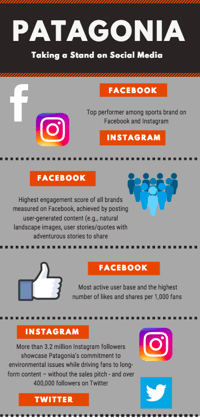
From our earliest days, stories have transcended generations, delighted and engaged us through emotions, and connected us to others. Stories are the common ground that enables us to communicate, overcoming our insecurities and our differences.
Brand story is a powerful tool for communicating and enriching brand positioning. In fact, brand story as a strategy is so compelling that it can play a significant role in communicating nearly every aspect of your business.
With the advent of social media, brands have not only had to translate their stories from traditional media channels to new media channels, but they’ve also had to consider the impact of two-way communication that social provides.
No longer are consumers just on the receiving end of a medium. Now, consumers can engage in the storytelling through back-and-forth conversation. Social opens up the potential for brands to tell their meaningful stories to a broad audience and connect with people on a deeper, more engaging level. Not only are both brands and consumers telling each other stories, but via social media, consumers are helping to shape the story of who exactly a brand is and what they stand for.
According to Carla Johnson, author, keynote speaker and Chief Experience Officer at Type A Communications, marketers who think that “brand advocates” are limited to customers are missing out on a tremendous opportunity to create influence and emotionally engage large audiences through social influence.
“The most critical thing that marketers forget about how customers buy today is it’s the experience that matters most. And, it’s the experience that creates the pivot point. So, we also have to look at the fact that people can be huge fans and significant influencers and advocates when they’ve never even been, and perhaps will never be, a customer. They will create the experiences and influence that the brand simply cannot.”
Leveraging social media platforms showcasing commitment to the environment and building a community of people with like values

Patagonia founder, Yvonne Chouinard, aims to “Build the best product, cause no unnecessary harm, use business to inspire and implement solutions to the environmental crisis.” Since 1972, Patagonia has been making quality outdoor wear with minimal environmental harm and became a fundamental “green” company long before it was the cool thing to do.
Everything they do at Patagonia — from protesting Utah environmental policy to sourcing organic cotton to telling people not to buy shirts to suing the president — supports this purpose. Yes, the product is good, and employees and consumers love it. But it’s not the product that bonds them to the brand and makes them stand out as the choice for many outdoor enthusiasts. Rather than leaning on the tangible aspects of their product alone, Patagonia gets consumers to explore and remain loyal because of their deep, purpose and high-integrity actions.
The outdoor environmental enthusiasts have done an excellent job providing consumers with a smorgasbord of interesting and relevant information about both sport and the environment. By leveraging social media content to link back to its core beliefs continuously, Patagonia's messaging and voice remain consistent and authentic.
Patagonia has gathered a large following on their social media with over 1 million ‘likes’ on Facebook and over 400,000 followers on Twitter. In 2016, Patagonia announced that it would dona
te 100% of its Black Friday sales to organizations that benefit the environment. Social media caught word, and it spread like wildfire – this tweet received nearly 1,000% greater engagement rate than others on their profile:

So, what can brands learn from the Patagonia playbook? Our brand strategy consulting firm advices clients to understand their consumer base and what matters to them, and connect with consumers in ways that go far deeper than product attributes. Give passionate advocates the tools to spread your message by fostering meaningful conversation. Brands that identify their target audience, and create content relevant to that audience on social media, are more likely to prosper from a loyal customer base, cost savings (compared to traditional marketing strategies), and increased sales.
Recent Posts
Posts by Topics
- Brand Strategy (57)
- Brand Strategy Consulting (28)
- Brand Differentiation (27)
- Customer Experience (24)
- Brand Positioning (22)
- Marketing Strategy (9)
- Brand Extension Strategy (8)
- Customer Behavior (8)
- Brand Architecture Strategy (7)
- Brand Extension (7)
- Brand Growth (7)
- Brand Portfolio & Architecture (7)
- Brand Purpose (7)
- Brand Value Proposition (7)
- Brand Engagement (6)
- Brand Portfolio Strategy (6)
- Brand Storytelling (6)
- Rebranding Strategy (6)
- Brand Awareness (5)
- Brand Image (5)
- Branding (5)
- Rebranding (5)
- Technology (5)
- B2B Brand Strategy (4)
- Brand Experience (4)
- Value Proposition (4)
- Brand Extendibility (3)
- Brand Metrics (3)
- Brand Repositioning (3)
- Corporate Branding (3)
- Differentiation Strategy (3)
- Measurement & Metrics (3)
- Brand Engagement Strategy (2)
- Brand Portfolio (2)
- Brand Promise (2)
- Brand Voice (2)
- Digital Marketing (2)
- Digital and Brand Experience (2)
- Employee Brand Engagement (2)
- Brand Architecture (1)
- Brand Development (1)
- Brand Equity (1)
- Brand Identity (1)
- Brand Measurement (1)
- Brand Name (1)
- Brand Strategy Consultants (1)
- Brand Strategy Firms (1)
- Digital Strategy (1)
- Internal Branding (1)
- Messaging (1)


